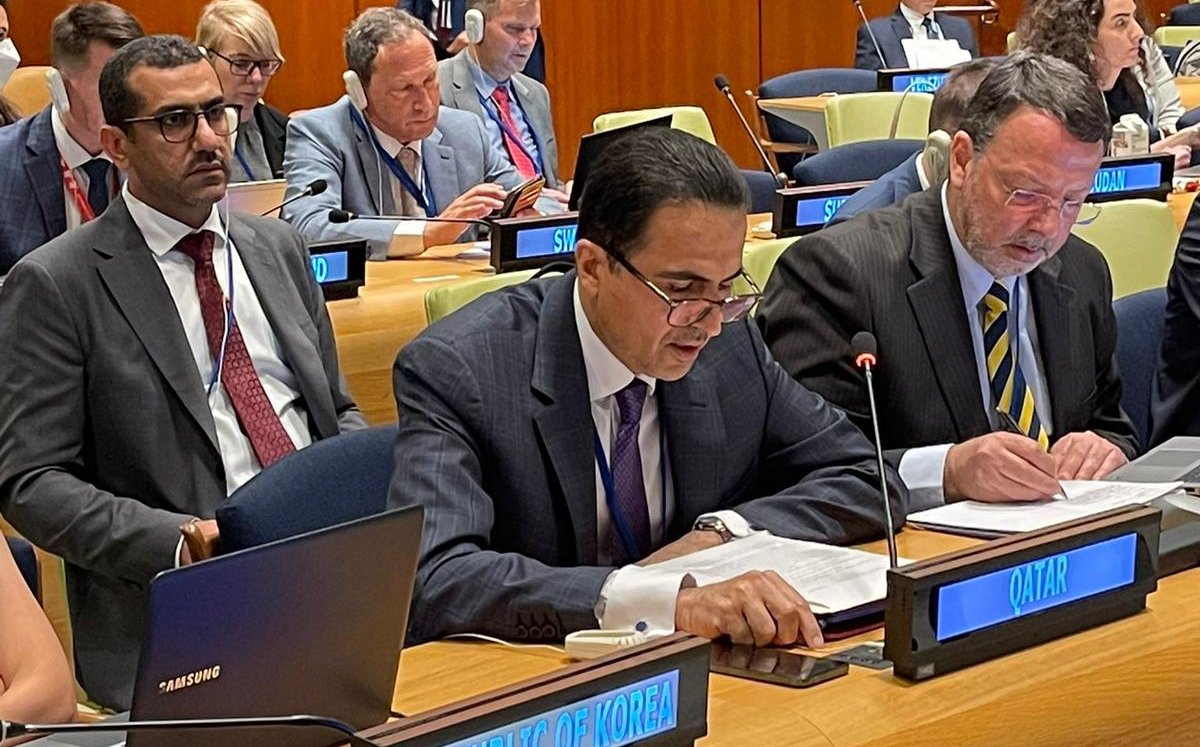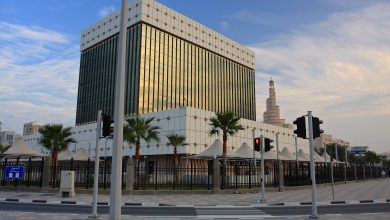Qatar Renews Calls for Nuke-Free Middle East Region
قطر تجدد الدعوة إلى جعل منطقة الشرق الأوسط خالية من الأسلحة النووية
QNA
New York: The State of Qatar renewed Wednesday its calls for a nuclear-free Middle East, stressing that the establishment of nuclear-free zones is a key step to boost non-proliferation system and achieve a full nuclear disarmament, and that the establishment of a nuclear weapons-free zone in the Middle East is a common goal for the peoples of the region and the entire international community.
This came in the State of Qatar’s statement delivered by HE Acting Director of the Department of International Organizations at the Ministry of Foreign Affairs Ali Khalfan Al Mansouri before the Second Committee of the Tenth Review Conference of the Parties to the Treaty on the Non-Proliferation of Nuclear Weapons, which runs from Aug. 1 to 26, with a focus on the regional issues, including with respect to the Middle East and implementation of the 1995 Middle East Resolution.
Over the past decades, five nuclear weapon-free zones have been established that include the commitment of the signatories not to possess nuclear weapons, and to sign comprehensive safeguards agreements with the agency (International Atomic Energy Agency), said Al Mansouri, noting that these zones contributed to enhancing stability in the regions where they were established, and also contributed to bringing the treaty closer to the ultimate goal of a world free of nuclear weapons.
Al Mansouri voiced the State of Qatar’s regret that the Middle East region remained far from the establishment of a nuke-free region owing to the intransigence of Israel, which has not acceded to the Treaty on the Non-Proliferation of Nuclear Weapons (NPT), and rejected to subject its nuclear facilities to the International Atomic Energy Agency safeguards system, and seeks to obstruct any serious preliminary negotiations to achieve the goal of establishing the region.
He reiterated that the goal of establishing a nuke-free region in the Middle East is a common goal for the peoples of the region and the entire international community, and it is a collective responsibility under international resolutions and the outcomes of the 1995, 2010 and 2015 review conferences.
His Excellency indicated that the decision of the 1995 Review Conference on the Middle East is an integral part of the indefinite extension of the treaty, and will remain in effect until its implementation and achievement of its objectives.
Al Mansouri warned that the delay in establishing a nuke-free zone bears consequences that threaten international and regional peace and security, expressing the State of Qatar’s aspirations that the signatories to the treaty, particularly the countries sponsoring the Middle East resolution reached at the 1995 conference, would translate their responsibilities into taking practical steps to ensure an early establishment of the zone. He further stressed the need for the United Nations (UN) and the UN Secretary-General in person to play their roles in seeking to establish the zone, and called on the Security Council, by virtue of its responsibilities in maintaining international peace and security, and under its resolutions, specifically Resolutions 487 (1981) and 687 (1991) to contribute to the efforts to establish the zone.
“Establishing the region is a collective responsibility imposed by international documents and resolutions, and that the continuation of the current stalemate is a matter that exacerbates the instability in the region, and detracts from the credibility of the treaty and the decisions of its review conferences,” Al Mansouri said, calling on the Tenth Conference to be back on track, and take actual steps to achieve progress towards the establishment of the zone.
He reiterated that the accession of Israel to the NPT and subjecting its nuclear facilities to the safeguards system paves the way for the establishment of the zone, and will boost the credibility of the treaty, bring it closer to universality, and speed up the implementation the goal of nuclear disarmament goal.
Al Mansouri also expressed the State of Qatar’s aspiration that the Final Document of the Tenth Conference would include practical steps based on the 1995 Middle East Resolution, and the decisions of the 2010 and 2015 Review Conferences, expressing the State of Qatar’s willingness to launch consultations with the rest of the parties to reach the appropriate formulation.
قنا
نيويورك: جددت دولة قطر الدعوة إلى جعل منطقة الشرق الأوسط خالية من الأسلحة النووية، مؤكدة على أن إنشاء المناطق الخالية من الأسلحة النووية هو خطوة أساسية لتوطيد نظام عدم الانتشار، ولتحقيق هدف الإزالة الكاملة للأسلحة النووية، وشددت على أن إنشاء منطقة في الشرق الأوسط خالية من الأسلحة النووية هو هدف مشترك لشعوب المنطقة وللمجتمع الدولي برمته.
جاء هذا في بيان دولة قطر الذي أدلى به سعادة السيد علي خلفان المنصوري، مدير إدارة المنظمات الدولية بالإنابة بوزارة الخارجية، أمام اللجنة الثانية للمؤتمر الاستعراضي العاشر للأطراف في معاهدة عدم انتشار الأسلحة النووية، الذي يعقد خلال الفترة من 1 – 26 أغسطس الجاري، حول البند الخاص بـ “المسائل الإقليمية بما في ذلك ما يتعلق بالشرق الأوسط، وتنفيذ قرار عام 1995 بشأن الشرق الأوسط”.
وقال المنصوري: إنه على مدى العقود الماضية، أنشئت خمس مناطق خالية من الأسلحة النووية تتضمن التزام الدول الموقعة بعدم حيازة أسلحة نووية، وبإبرام اتفاقات ضمانات شاملة مع الوكالة، مشيرا إلى أن هذه المناطق ساهمت في تعزيز الاستقرار في الأقاليم التي أنشئت فيها، كما ساهمت في تقريب المعاهدة إلى الهدف الأسمى المتمثل في الوصول إلى عالم خال من الأسلحة النووية.
وأعرب عن أسف دولة قطر من أن منطقة الشرق الأوسط قد بقيت بعيدة عن إنشاء المنطقة بسبب تعنت إسرائيل التي لم تنضم إلى معاهدة عدم انتشار الأسلحة النووية، ورفضت إخضاع منشأتها النووية لنظام ضمانات الوكالة الدولية للطاقة الذرية، وتسعى لإعاقة أي مفاوضات تمهيدية جدية لتحقيق هدف إنشاء المنطقة.
وشدد على أن هدف إنشاء منطقة في الشرق الأوسط خالية من الأسلحة النووية هو هدف مشترك لشعوب المنطقة وللمجتمع الدولي برمته، وهو مسؤولية جماعية وفق القرارات الدولية ومخرجات مؤتمرات الاستعراض للأعوام 1995 و2010 و2015.
ولفت سعادته إلى أن قرار المؤتمر الاستعراضي لعام 1995 الخاص بالشرق الأوسط هو جزء لا يتجزأ من صفقة التمديد اللانهائي للمعاهدة، وسيظل ساريا لحين تنفيذه وتحقيق أهدافه.
وتابع أن غياب التقدم نحو إنشاء المنطقة يحمل عواقب تهدد السلم والأمن الدولي والإقليمي، معربا عن تطلع دولة قطر إلى أن تترجم الدول الأطراف في المعاهدة، وبالأخص الدول الراعية لقرار الشرق الأوسط بمؤتمر 1995، مسؤولياتها باتخاذ خطوات عملية لضمان الإنشاء المبكر للمنطقة، مؤكدا على ضرورة أن تلعب الأمم المتحدة، والأمين العام للأمم المتحدة شخصيا دورهما في السعي لإنشاء المنطقة، ودعا مجلس الأمن بحكم مسؤولياته في حفظ السلم والأمن الدوليين، وبموجب قراراته وتحديدا القرارين 487 (1981) و687 (1991) إلى أن يساهم في جهود إنشاء المنطقة.
وشدد المنصوري على أن “مسؤولية إنشاء المنطقة هي مسؤولية جماعية تفرضها الوثائق والقرارات الدولية، وأن استمرار الانسداد الحالي هو أمر يفاقم حالة عدم الاستقرار التي تشهدها المنطقة، وينتقص من مصداقية المعاهدة وقرارات مؤتمراتها الاستعراضية”، داعيا المؤتمر العاشر لتصحيح المسار، واتخاذ خطوات فعلية تحقق التقدم نحو إنشاء المنطقة.
وأضاف أن انضمام إسرائيل لمعاهدة عدم الانتشار وتطبيق نظام الضمانات على منشآتها النووية هو إجراء يهيئ الأرضية لإنشاء المنطقة، وسيعزز مصداقية المعاهدة ويقربها من العالمية، ويسرع بتنفيذ هدف نزع السلاح النووي.
وأعرب المنصوري عن تطلع دولة قطر لتضمين الوثيقة الختامية للمؤتمر العاشر خطوات عملية تبني على قرار الشرق الأوسط لعام 1995، وقراري المؤتمرين الاستعراضيين لعام 2010 و2015، معربا عن استعداد دولة قطر للتشاور مع بقية الدول الأطراف للوصول إلى الصياغة المناسبة.




